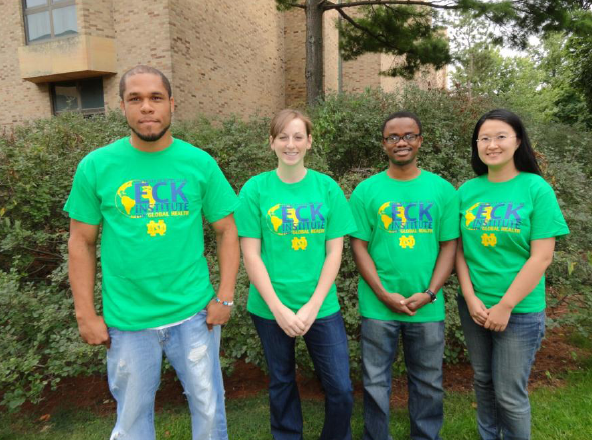Through a competitive process the Eck Institute for Global Health has selected four outstanding University of Notre Dame PhD candidates who will receive fellowships for the 2011-2012 academic year. Selection of fellows was based on the student’s academic standing, scholarly activities, merit of their research program and its relevance to the mission of the Eck Institute. The fellowship will allow students to focus on their global health-related research projects, and thereby contribute to bringing new knowledge to global health solutions. Students will also participate in Eck Institute for Global Health activities, allowing them to become part of a greater global health research community.
The awards went to (from left to right in photo below):
 Anthony Clemons is a third year Ph.D. candidate in the Department of Biological Sciences. He is co-advised by Drs. David Severson, University of Notre Dame, and Molly Duman-Scheel, Indiana University School of Medicine, South Bend. Clemons holds a Bachelor of Science from Indiana State University. His research interests include the developmental biology of mosquito salivary glands, and the vector capacity of Aedes aegypti mosquitos to transmit dengue virus. Dengue fever is a mosquito-borne viral disease that annually infects more than 50 million people Worldwide and the incidence is growing dramatically. There is no treatment or vaccine to prevent infection.
Anthony Clemons is a third year Ph.D. candidate in the Department of Biological Sciences. He is co-advised by Drs. David Severson, University of Notre Dame, and Molly Duman-Scheel, Indiana University School of Medicine, South Bend. Clemons holds a Bachelor of Science from Indiana State University. His research interests include the developmental biology of mosquito salivary glands, and the vector capacity of Aedes aegypti mosquitos to transmit dengue virus. Dengue fever is a mosquito-borne viral disease that annually infects more than 50 million people Worldwide and the incidence is growing dramatically. There is no treatment or vaccine to prevent infection.
Ellen Flannery is a fifth year Ph.D. student in the Department of Biological Sciences advised by Dr. Molly Duman Scheel at the Indiana University School of Medicine, South Bend. Flannery’s research is focused on the development of the olfactory system in the Ae. aegypti mosquito that transmits yellow fever and dengue virus. Olfactory function is critical in many mosquito behaviours, such as host-seeking, mate selection and oviposition site selection, and consequently the spread of disease. This research will contribute to the development of novel mosquito control, and thus disease control, technologies. Flannery is a graduate of Central Michigan University.
Emmanuel Adu-Gyamfi is a fourth year student in the Department of Chemistry and Biochemistry laboratory of Dr. Robert Stahelin at the Indiana School of Medicine, South Bend. Adu-Gyamfi is applying state-of-the-art approaches to understand how Ebola virus spreads from cell to cell. Ebola virus, found only in low-income countries, causes a highly fatal disease for which there is no treatment or vaccine. This work will contribute towards the search for new drugs to treat the disease. Adu-Gyamfi received his BS in Biochemistry from the University of Ghana.
Ling Sun is a third year student in the Department of Aerospace and Mechanical Engineering laboratory of Dr. Phillippe Sucosky. Sun employs novel models to assess the role of hemodynamic shear stress in calcific aortic valve disease. Chronic non-communicable diseases, such as heart disease, are now the second leading cause of morbidity and mortality in low- and middle-income countries. Sun received her Bachelor in Biomedical Engineering from Zhejiang University, China.
The University of Notre Dame Eck Institute for Global Health is a university-wide institution founded in 2009 and based on an endowment from the Frank Eck Family. The Institute recognizes health as a fundamental human right and endeavors to promote research, training and service to advance health standards for all people, especially people in lo
w- and middle-income countries who are disproportionately impacted by preventable diseases. More information on the Eck Institute for Global Health is available at: http://globalhealth.nd.edu . Indiana University School of Medicine, South Bend is a partner of the Eck Institute. Ph.D. candidates who are advised by Indiana University School of Medicine, South Bend faculty are enrolled as University of Notre Dame graduate students.